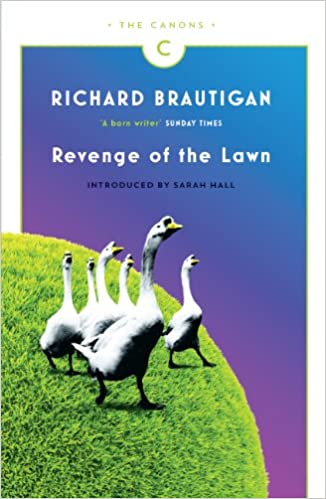Book of a Lifetime: Revenge of the Lawn by Richard Brautigan
From The Independent archive: Sarah Hall on ‘Revenge of the Lawn’ by Richard Brautigan

Many attempts have been made to define Richard Brautigan’s work – Beat, scat, Zen Buddhist, magical-realist, hippie, cult, outsider, naive, pacific, lunatic. Nowhere is his work’s resistance to categorical designation more apparent than in Revenge of the Lawn: Stories 1962-1970. I came across this oddest collection in my late teens, which might be a perfect age to discover Brautigan. The vim and originality of tones and images, the berserk plots and off-the-wall incidents, seemed perfectly pitched to appeal to a rebellious, youthful sense of humour. The language was deceptively informal, poetic, “hip”.
Back then I was a troubled reader, full of northwest rain and rural loneliness. Books felt like portals into even remoter worlds – papery oubliettes where no one else existed and the author was absent. I wanted company, not a textual abstract. But here was a sudden, slender volume that was host to a multitude of companionable voices. Some of the pieces were startlingly brief; I could open the pages and hop in and out. More than this: amid the rabble of characters was a singular presence – the writer was there, in some state or other. He was there, playing around, often exposed and steering the narrative the way authors were not supposed to. I could imagine verbal and metaphysical light bulbs going on above his head. I could see him crafting these extraordinary, joyful, lovelorn gifts of prose and handing them over to me, the reader. And what gifts!

I loved the operatic, whisky-cooking grandmothers, the man who replaces his plumbing with poetry only to end up in a fist-fight with the verses of Emily Dickinson, and that little old lady who demands a pound of liver from the butcher for her bees. I loved the strings of words: “ragged black toothache sky”, “wheelbarrow-sized pile of steaming dragon shit”, “April in God-damn”. I was moved by the difficult human exchanges, heartbreaks and eroticisms. I was charmed by the disorderly conduct, wrong-footed by tales that seemed to be about banking, and then were about corpses, and then were about banking again. This was the imagination unbound; on the page, literally anything was possible.
What appealed to me then appeals to me now. Brautigan is a folk-artist, a master storyteller, and a master rule-breaker. He isn’t coy or transparent. He is enormously ambitious and because of this, occasionally falls off the wire – with exuberant, random metaphors that don’t quite work and sentences employed simply to justify a previous whimsy. But I don’t care. I like heart and imperfection. And because of it, the stories never loose their freshness. Revenge of the Lawn remains vibrant, radical and generous: 25 years after his death, Brautigan is still, like his poverty-stricken Oregon typist, “pounding at the gates of American literature”.
Join our commenting forum
Join thought-provoking conversations, follow other Independent readers and see their replies
Comments